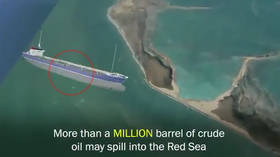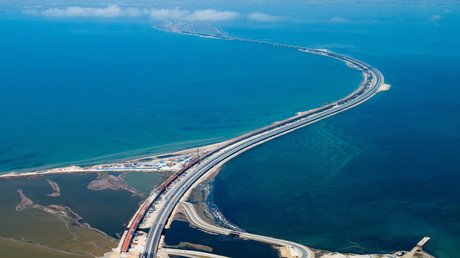‘Ticking bomb’: Abandoned tanker in Red Sea could EXPLODE & spill 1m barrels of oil into the ocean

An abandoned tanker off Yemen’s coast threatens to turn the Red Sea black. Experts warn that a build-up of volatile gasses in the ship could cause a “catastrophic” explosion that would dump millions of gallons of oil into the sea.
The tanker, moored near the Yemeni port of Ras Isa, contains around 1.1 million barrels of petroleum, but has been stranded at its present spot since 2015, where locals have used the ship as a make-shift barge. Sitting for years without maintenance, however, the decrepit vessel is now deteriorating rapidly, risking a global environmental calamity of historic dimensions.
Oil Tanker Off Yemen Coast Close To Exploding https://t.co/2cuhz4vceHpic.twitter.com/uLhDSceFhC
— Oil & Gas Advisors (@OG_Advisors) July 23, 2019
The vessel belongs to the country’s state-owned oil firm, the Yemen Oil and Gas Corporation.
Depending on the time of year and water currents, a spill from the tanker could quickly leach into the Suez Canal, and might spread as far as the Strait of Hormuz, United Nations Undersecretary General for Humanitarian Affairs Mark Lowcock told the UN Security Council.
“I leave it to you to imagine the effect of such a disaster on the environment, shipping lanes and the global economy,” he said, adding “discussions continue to resolve this as quickly as possible.”
Also on rt.com War in Yemen can be stopped, warring parties support peace deal – UN envoyLowcock told the Security Council that his agency planned to make a risk assessment of the ship this week, but said his team was rebuffed by local authorities, who refused to provide the necessary permits.
Though the Houthi rebels in control of Yemen’s government – known formally by their party title, “Ansar Allah” – initially made the request for assistance with the floating time bomb, Lowcock said Houthi officials “continue to delay” any steps to address the problem.
The Houthi-led government has previously called for assurances that it will be allowed to extract the ship’s valuable cargo – nearly $60 million in petroleum – after the vessel is salvaged, however international sanctions on the country currently make that plan untenable, perhaps explaining the government’s reluctance to act.
Yemen's Saudi-backed government in exile used the situation with the decaying tanker to criticize their rivals with a public service announcement-style video.
Yemeni Government warns of a looming Huge Oil Spill into the Red Sea due to Houthis’ obstruction to maintenance works of crude oil tanker carrying more than a million barrel of crude oil. pic.twitter.com/Aiz1qwNeFH
— رئاسة مجلس الوزراء اليمني (@Yemen_PM) July 13, 2019
Since the country’s civil war kicked off in 2015, two governments vie for legitimacy in Yemen, though only the Saudi-backed state enjoys international recognition. The conflict has thrown the country into one of the world’s worst humanitarian disasters, according to the UN and rights groups. Over 14 million Yemenis depend on international aid in one way or another, a massive proportion of the country’s population of 24 million.
Fears of an oil ‘explosion’ are not merely metaphoric; gasses building up in the tanker’s storage compartments could produce a blast with serious explosive force, Doug Weir, a policy expert at the UK-based Conflict and Environment Observatory, told CNN. The explosion risk ramps up not only the danger to the environment, but any unfortunate bystander who happens to be near the vessel at the moment the hull gives way.
Like this story? Share it with a friend!














